Business Law 2022 Case Study
VerifiedAdded on 2022/09/26
|8
|1966
|19
AI Summary
Contribute Materials
Your contribution can guide someone’s learning journey. Share your
documents today.
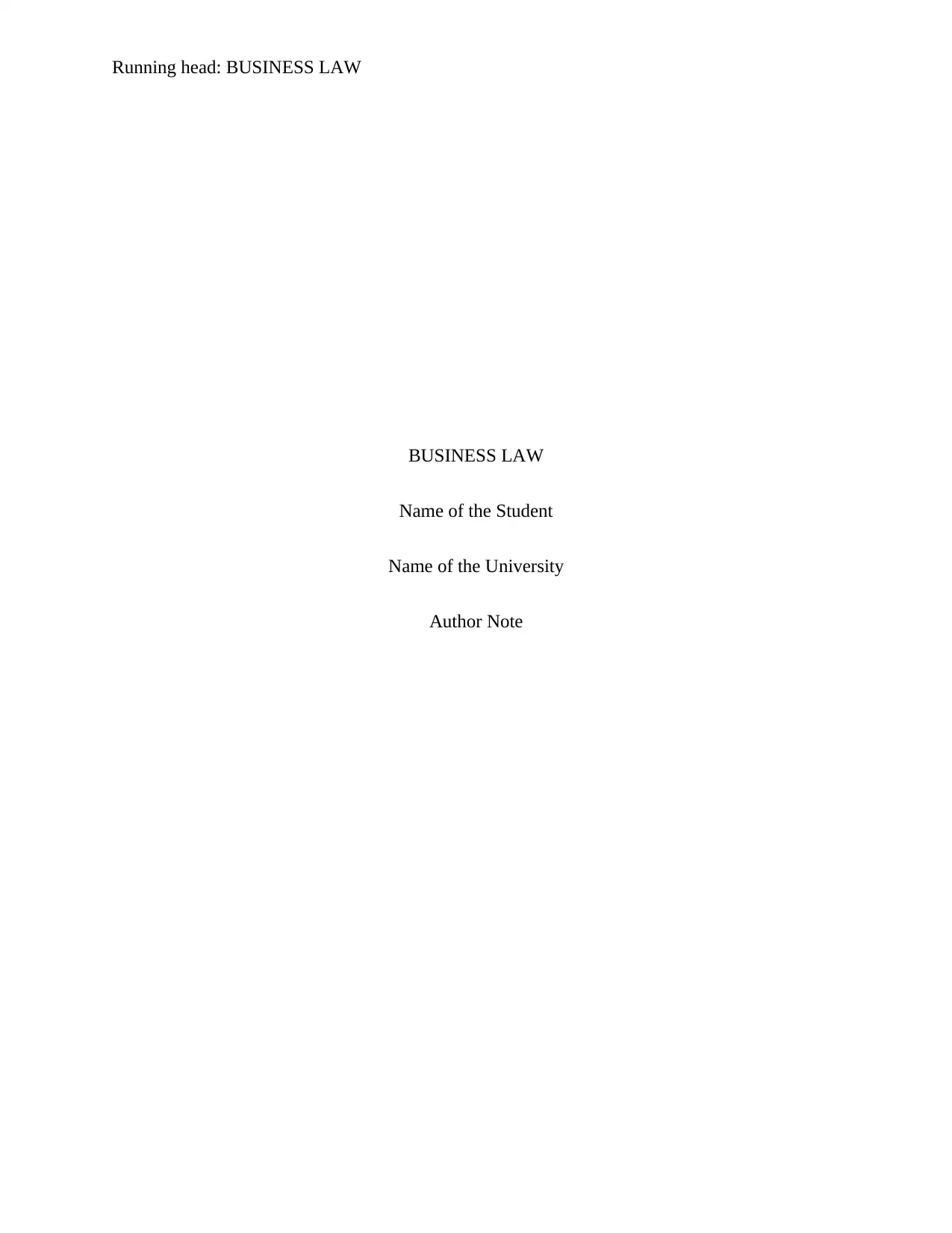
Running head: BUSINESS LAW
BUSINESS LAW
Name of the Student
Name of the University
Author Note
BUSINESS LAW
Name of the Student
Name of the University
Author Note
Secure Best Marks with AI Grader
Need help grading? Try our AI Grader for instant feedback on your assignments.
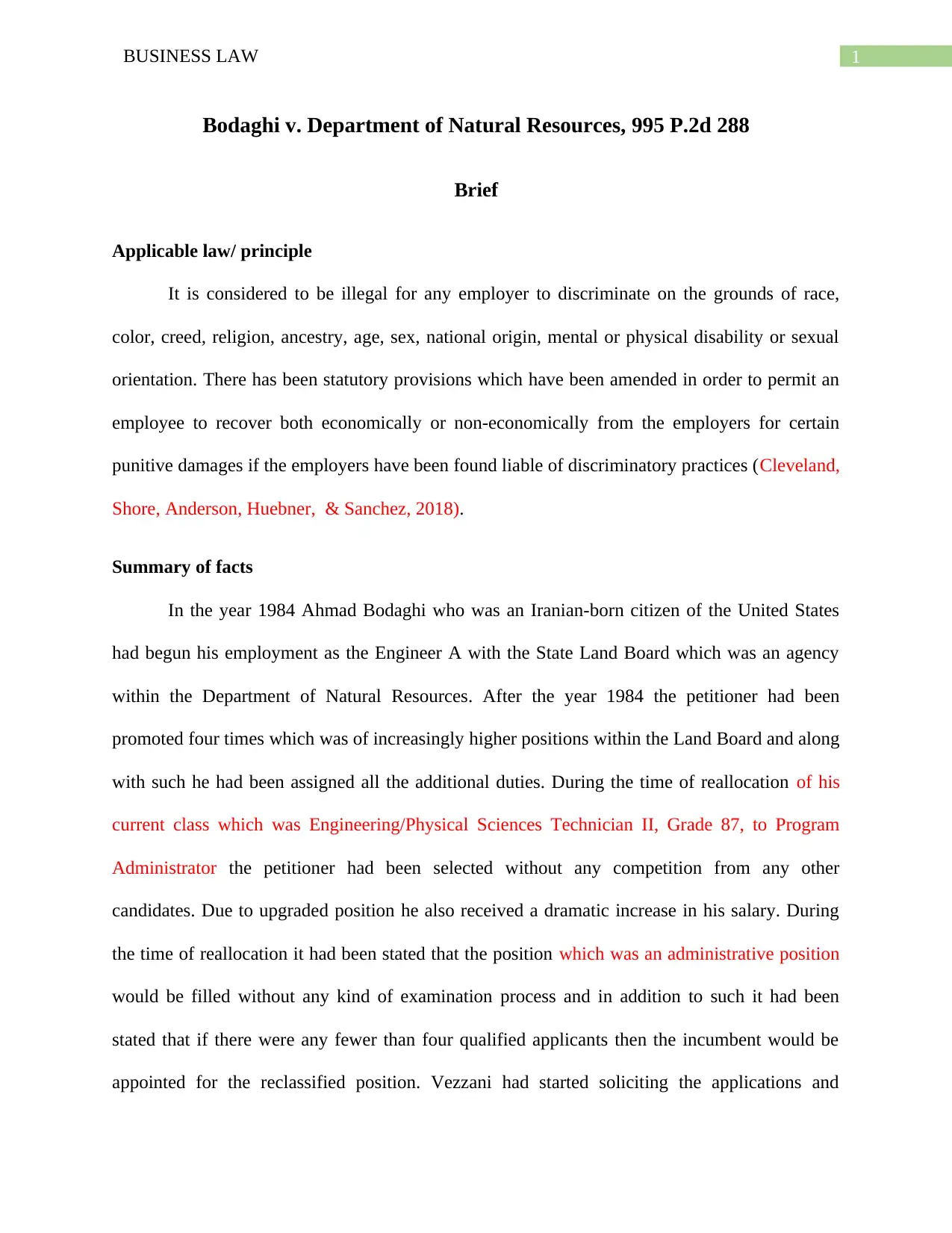
1BUSINESS LAW
Bodaghi v. Department of Natural Resources, 995 P.2d 288
Brief
Applicable law/ principle
It is considered to be illegal for any employer to discriminate on the grounds of race,
color, creed, religion, ancestry, age, sex, national origin, mental or physical disability or sexual
orientation. There has been statutory provisions which have been amended in order to permit an
employee to recover both economically or non-economically from the employers for certain
punitive damages if the employers have been found liable of discriminatory practices (Cleveland,
Shore, Anderson, Huebner, & Sanchez, 2018).
Summary of facts
In the year 1984 Ahmad Bodaghi who was an Iranian-born citizen of the United States
had begun his employment as the Engineer A with the State Land Board which was an agency
within the Department of Natural Resources. After the year 1984 the petitioner had been
promoted four times which was of increasingly higher positions within the Land Board and along
with such he had been assigned all the additional duties. During the time of reallocation of his
current class which was Engineering/Physical Sciences Technician II, Grade 87, to Program
Administrator the petitioner had been selected without any competition from any other
candidates. Due to upgraded position he also received a dramatic increase in his salary. During
the time of reallocation it had been stated that the position which was an administrative position
would be filled without any kind of examination process and in addition to such it had been
stated that if there were any fewer than four qualified applicants then the incumbent would be
appointed for the reclassified position. Vezzani had started soliciting the applications and
Bodaghi v. Department of Natural Resources, 995 P.2d 288
Brief
Applicable law/ principle
It is considered to be illegal for any employer to discriminate on the grounds of race,
color, creed, religion, ancestry, age, sex, national origin, mental or physical disability or sexual
orientation. There has been statutory provisions which have been amended in order to permit an
employee to recover both economically or non-economically from the employers for certain
punitive damages if the employers have been found liable of discriminatory practices (Cleveland,
Shore, Anderson, Huebner, & Sanchez, 2018).
Summary of facts
In the year 1984 Ahmad Bodaghi who was an Iranian-born citizen of the United States
had begun his employment as the Engineer A with the State Land Board which was an agency
within the Department of Natural Resources. After the year 1984 the petitioner had been
promoted four times which was of increasingly higher positions within the Land Board and along
with such he had been assigned all the additional duties. During the time of reallocation of his
current class which was Engineering/Physical Sciences Technician II, Grade 87, to Program
Administrator the petitioner had been selected without any competition from any other
candidates. Due to upgraded position he also received a dramatic increase in his salary. During
the time of reallocation it had been stated that the position which was an administrative position
would be filled without any kind of examination process and in addition to such it had been
stated that if there were any fewer than four qualified applicants then the incumbent would be
appointed for the reclassified position. Vezzani had started soliciting the applications and
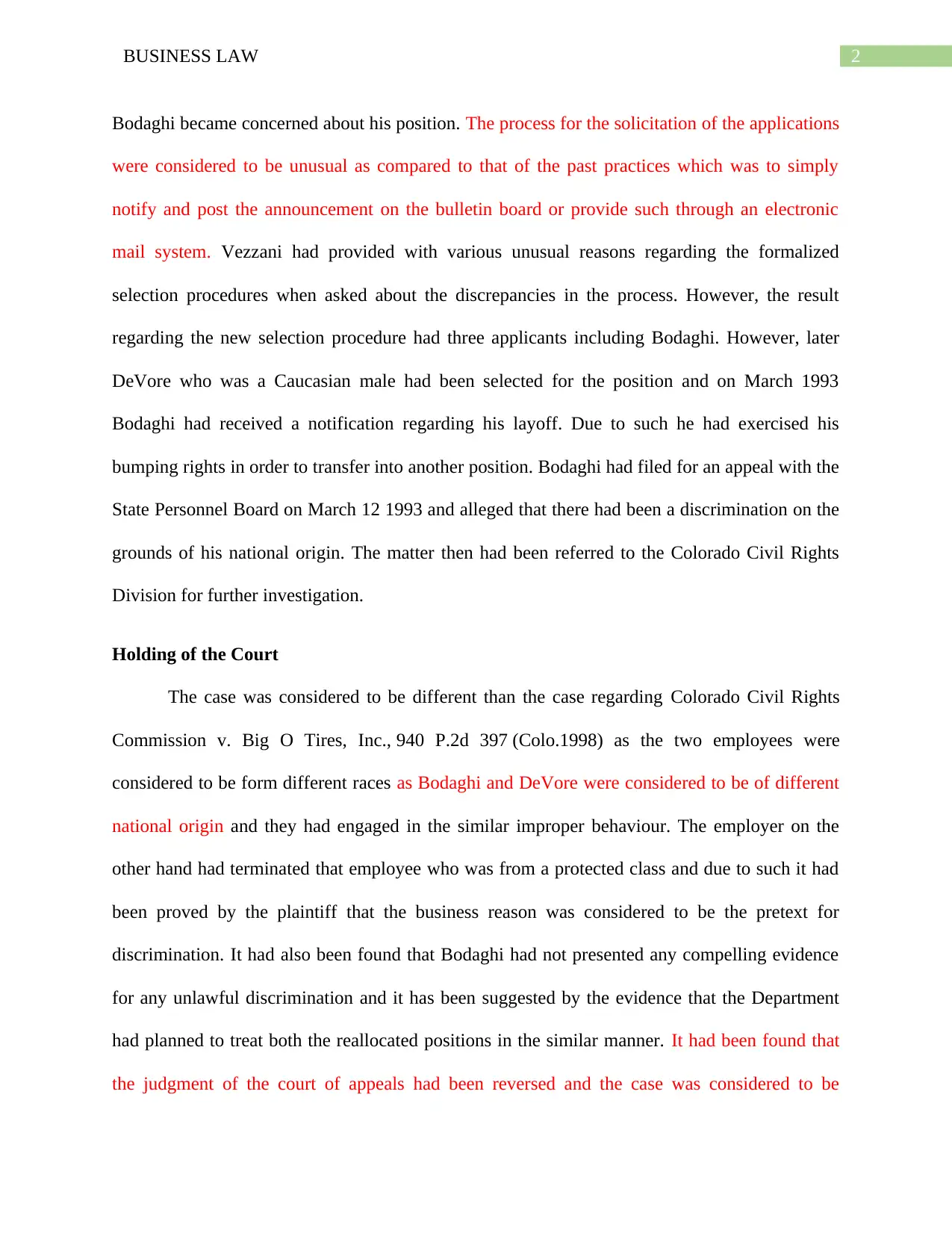
2BUSINESS LAW
Bodaghi became concerned about his position. The process for the solicitation of the applications
were considered to be unusual as compared to that of the past practices which was to simply
notify and post the announcement on the bulletin board or provide such through an electronic
mail system. Vezzani had provided with various unusual reasons regarding the formalized
selection procedures when asked about the discrepancies in the process. However, the result
regarding the new selection procedure had three applicants including Bodaghi. However, later
DeVore who was a Caucasian male had been selected for the position and on March 1993
Bodaghi had received a notification regarding his layoff. Due to such he had exercised his
bumping rights in order to transfer into another position. Bodaghi had filed for an appeal with the
State Personnel Board on March 12 1993 and alleged that there had been a discrimination on the
grounds of his national origin. The matter then had been referred to the Colorado Civil Rights
Division for further investigation.
Holding of the Court
The case was considered to be different than the case regarding Colorado Civil Rights
Commission v. Big O Tires, Inc., 940 P.2d 397 (Colo.1998) as the two employees were
considered to be form different races as Bodaghi and DeVore were considered to be of different
national origin and they had engaged in the similar improper behaviour. The employer on the
other hand had terminated that employee who was from a protected class and due to such it had
been proved by the plaintiff that the business reason was considered to be the pretext for
discrimination. It had also been found that Bodaghi had not presented any compelling evidence
for any unlawful discrimination and it has been suggested by the evidence that the Department
had planned to treat both the reallocated positions in the similar manner. It had been found that
the judgment of the court of appeals had been reversed and the case was considered to be
Bodaghi became concerned about his position. The process for the solicitation of the applications
were considered to be unusual as compared to that of the past practices which was to simply
notify and post the announcement on the bulletin board or provide such through an electronic
mail system. Vezzani had provided with various unusual reasons regarding the formalized
selection procedures when asked about the discrepancies in the process. However, the result
regarding the new selection procedure had three applicants including Bodaghi. However, later
DeVore who was a Caucasian male had been selected for the position and on March 1993
Bodaghi had received a notification regarding his layoff. Due to such he had exercised his
bumping rights in order to transfer into another position. Bodaghi had filed for an appeal with the
State Personnel Board on March 12 1993 and alleged that there had been a discrimination on the
grounds of his national origin. The matter then had been referred to the Colorado Civil Rights
Division for further investigation.
Holding of the Court
The case was considered to be different than the case regarding Colorado Civil Rights
Commission v. Big O Tires, Inc., 940 P.2d 397 (Colo.1998) as the two employees were
considered to be form different races as Bodaghi and DeVore were considered to be of different
national origin and they had engaged in the similar improper behaviour. The employer on the
other hand had terminated that employee who was from a protected class and due to such it had
been proved by the plaintiff that the business reason was considered to be the pretext for
discrimination. It had also been found that Bodaghi had not presented any compelling evidence
for any unlawful discrimination and it has been suggested by the evidence that the Department
had planned to treat both the reallocated positions in the similar manner. It had been found that
the judgment of the court of appeals had been reversed and the case was considered to be
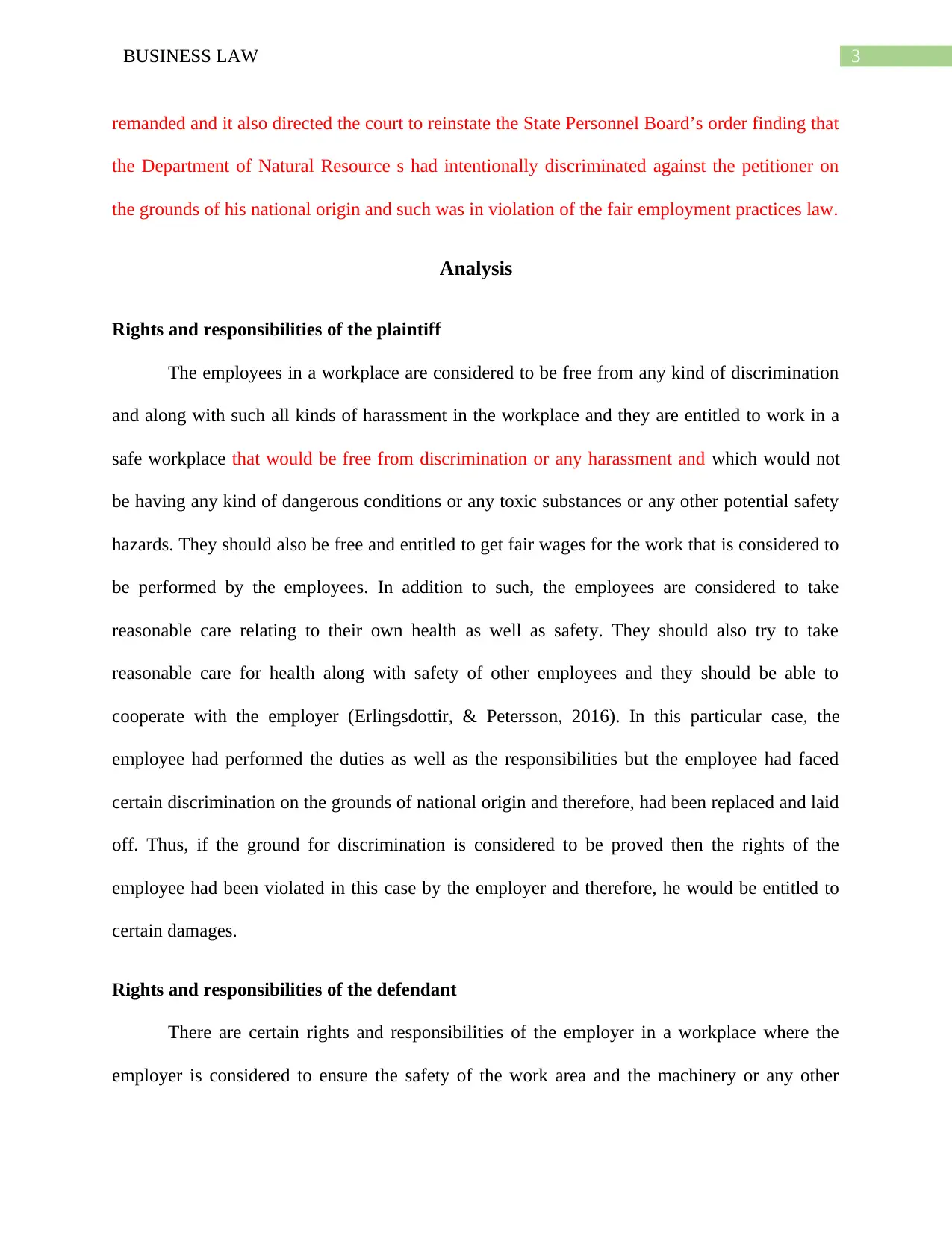
3BUSINESS LAW
remanded and it also directed the court to reinstate the State Personnel Board’s order finding that
the Department of Natural Resource s had intentionally discriminated against the petitioner on
the grounds of his national origin and such was in violation of the fair employment practices law.
Analysis
Rights and responsibilities of the plaintiff
The employees in a workplace are considered to be free from any kind of discrimination
and along with such all kinds of harassment in the workplace and they are entitled to work in a
safe workplace that would be free from discrimination or any harassment and which would not
be having any kind of dangerous conditions or any toxic substances or any other potential safety
hazards. They should also be free and entitled to get fair wages for the work that is considered to
be performed by the employees. In addition to such, the employees are considered to take
reasonable care relating to their own health as well as safety. They should also try to take
reasonable care for health along with safety of other employees and they should be able to
cooperate with the employer (Erlingsdottir, & Petersson, 2016). In this particular case, the
employee had performed the duties as well as the responsibilities but the employee had faced
certain discrimination on the grounds of national origin and therefore, had been replaced and laid
off. Thus, if the ground for discrimination is considered to be proved then the rights of the
employee had been violated in this case by the employer and therefore, he would be entitled to
certain damages.
Rights and responsibilities of the defendant
There are certain rights and responsibilities of the employer in a workplace where the
employer is considered to ensure the safety of the work area and the machinery or any other
remanded and it also directed the court to reinstate the State Personnel Board’s order finding that
the Department of Natural Resource s had intentionally discriminated against the petitioner on
the grounds of his national origin and such was in violation of the fair employment practices law.
Analysis
Rights and responsibilities of the plaintiff
The employees in a workplace are considered to be free from any kind of discrimination
and along with such all kinds of harassment in the workplace and they are entitled to work in a
safe workplace that would be free from discrimination or any harassment and which would not
be having any kind of dangerous conditions or any toxic substances or any other potential safety
hazards. They should also be free and entitled to get fair wages for the work that is considered to
be performed by the employees. In addition to such, the employees are considered to take
reasonable care relating to their own health as well as safety. They should also try to take
reasonable care for health along with safety of other employees and they should be able to
cooperate with the employer (Erlingsdottir, & Petersson, 2016). In this particular case, the
employee had performed the duties as well as the responsibilities but the employee had faced
certain discrimination on the grounds of national origin and therefore, had been replaced and laid
off. Thus, if the ground for discrimination is considered to be proved then the rights of the
employee had been violated in this case by the employer and therefore, he would be entitled to
certain damages.
Rights and responsibilities of the defendant
There are certain rights and responsibilities of the employer in a workplace where the
employer is considered to ensure the safety of the work area and the machinery or any other
Secure Best Marks with AI Grader
Need help grading? Try our AI Grader for instant feedback on your assignments.
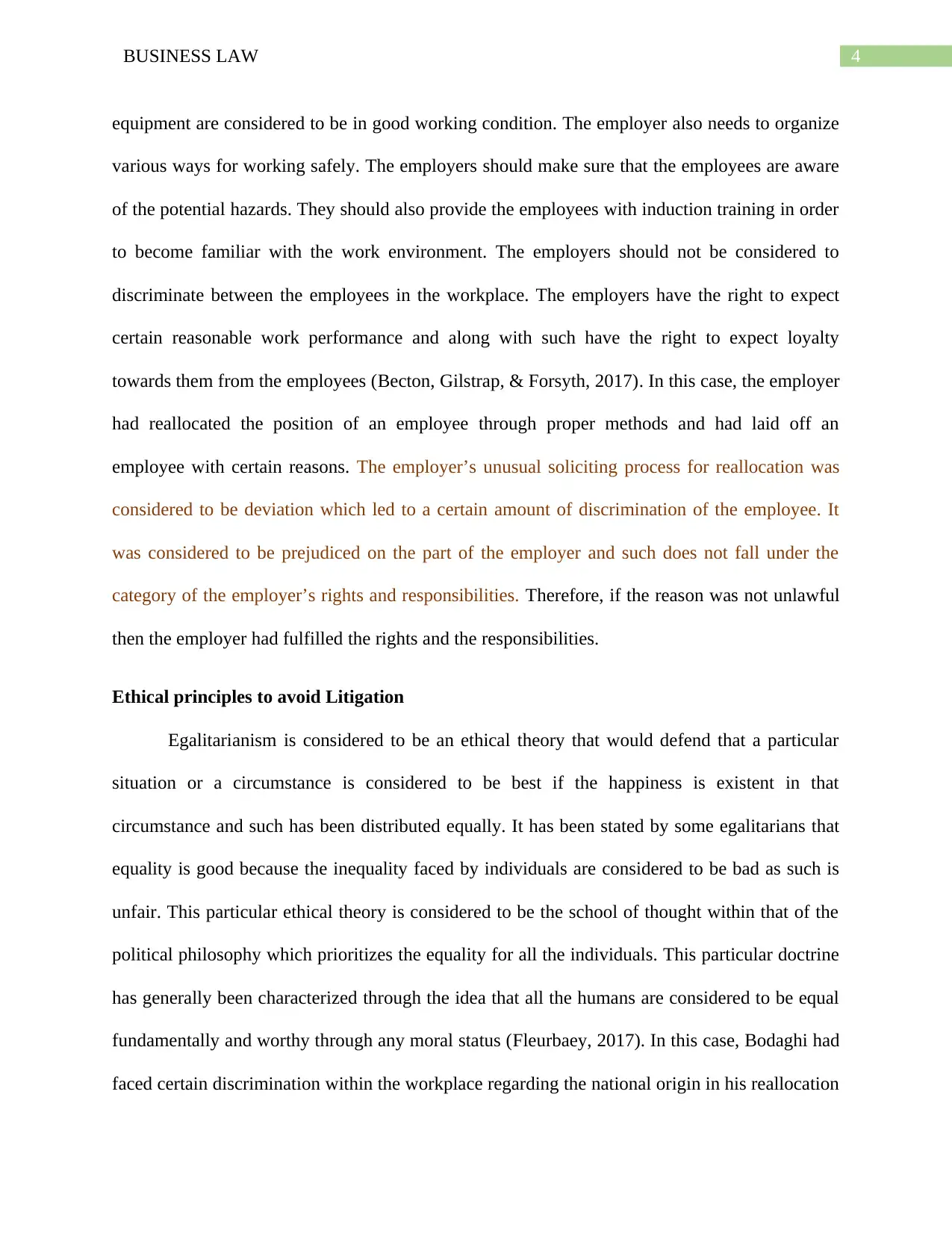
4BUSINESS LAW
equipment are considered to be in good working condition. The employer also needs to organize
various ways for working safely. The employers should make sure that the employees are aware
of the potential hazards. They should also provide the employees with induction training in order
to become familiar with the work environment. The employers should not be considered to
discriminate between the employees in the workplace. The employers have the right to expect
certain reasonable work performance and along with such have the right to expect loyalty
towards them from the employees (Becton, Gilstrap, & Forsyth, 2017). In this case, the employer
had reallocated the position of an employee through proper methods and had laid off an
employee with certain reasons. The employer’s unusual soliciting process for reallocation was
considered to be deviation which led to a certain amount of discrimination of the employee. It
was considered to be prejudiced on the part of the employer and such does not fall under the
category of the employer’s rights and responsibilities. Therefore, if the reason was not unlawful
then the employer had fulfilled the rights and the responsibilities.
Ethical principles to avoid Litigation
Egalitarianism is considered to be an ethical theory that would defend that a particular
situation or a circumstance is considered to be best if the happiness is existent in that
circumstance and such has been distributed equally. It has been stated by some egalitarians that
equality is good because the inequality faced by individuals are considered to be bad as such is
unfair. This particular ethical theory is considered to be the school of thought within that of the
political philosophy which prioritizes the equality for all the individuals. This particular doctrine
has generally been characterized through the idea that all the humans are considered to be equal
fundamentally and worthy through any moral status (Fleurbaey, 2017). In this case, Bodaghi had
faced certain discrimination within the workplace regarding the national origin in his reallocation
equipment are considered to be in good working condition. The employer also needs to organize
various ways for working safely. The employers should make sure that the employees are aware
of the potential hazards. They should also provide the employees with induction training in order
to become familiar with the work environment. The employers should not be considered to
discriminate between the employees in the workplace. The employers have the right to expect
certain reasonable work performance and along with such have the right to expect loyalty
towards them from the employees (Becton, Gilstrap, & Forsyth, 2017). In this case, the employer
had reallocated the position of an employee through proper methods and had laid off an
employee with certain reasons. The employer’s unusual soliciting process for reallocation was
considered to be deviation which led to a certain amount of discrimination of the employee. It
was considered to be prejudiced on the part of the employer and such does not fall under the
category of the employer’s rights and responsibilities. Therefore, if the reason was not unlawful
then the employer had fulfilled the rights and the responsibilities.
Ethical principles to avoid Litigation
Egalitarianism is considered to be an ethical theory that would defend that a particular
situation or a circumstance is considered to be best if the happiness is existent in that
circumstance and such has been distributed equally. It has been stated by some egalitarians that
equality is good because the inequality faced by individuals are considered to be bad as such is
unfair. This particular ethical theory is considered to be the school of thought within that of the
political philosophy which prioritizes the equality for all the individuals. This particular doctrine
has generally been characterized through the idea that all the humans are considered to be equal
fundamentally and worthy through any moral status (Fleurbaey, 2017). In this case, Bodaghi had
faced certain discrimination within the workplace regarding the national origin in his reallocation
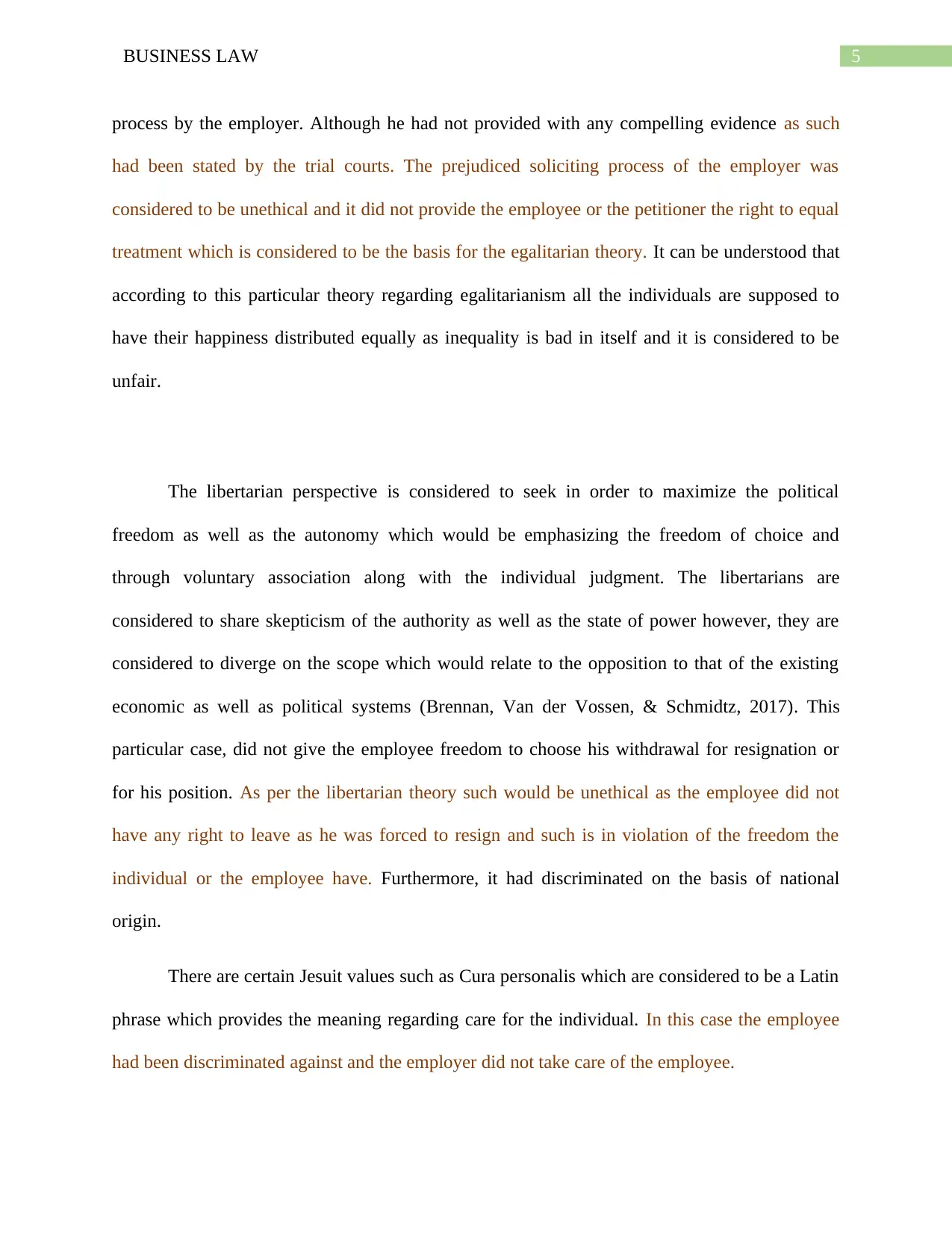
5BUSINESS LAW
process by the employer. Although he had not provided with any compelling evidence as such
had been stated by the trial courts. The prejudiced soliciting process of the employer was
considered to be unethical and it did not provide the employee or the petitioner the right to equal
treatment which is considered to be the basis for the egalitarian theory. It can be understood that
according to this particular theory regarding egalitarianism all the individuals are supposed to
have their happiness distributed equally as inequality is bad in itself and it is considered to be
unfair.
The libertarian perspective is considered to seek in order to maximize the political
freedom as well as the autonomy which would be emphasizing the freedom of choice and
through voluntary association along with the individual judgment. The libertarians are
considered to share skepticism of the authority as well as the state of power however, they are
considered to diverge on the scope which would relate to the opposition to that of the existing
economic as well as political systems (Brennan, Van der Vossen, & Schmidtz, 2017). This
particular case, did not give the employee freedom to choose his withdrawal for resignation or
for his position. As per the libertarian theory such would be unethical as the employee did not
have any right to leave as he was forced to resign and such is in violation of the freedom the
individual or the employee have. Furthermore, it had discriminated on the basis of national
origin.
There are certain Jesuit values such as Cura personalis which are considered to be a Latin
phrase which provides the meaning regarding care for the individual. In this case the employee
had been discriminated against and the employer did not take care of the employee.
process by the employer. Although he had not provided with any compelling evidence as such
had been stated by the trial courts. The prejudiced soliciting process of the employer was
considered to be unethical and it did not provide the employee or the petitioner the right to equal
treatment which is considered to be the basis for the egalitarian theory. It can be understood that
according to this particular theory regarding egalitarianism all the individuals are supposed to
have their happiness distributed equally as inequality is bad in itself and it is considered to be
unfair.
The libertarian perspective is considered to seek in order to maximize the political
freedom as well as the autonomy which would be emphasizing the freedom of choice and
through voluntary association along with the individual judgment. The libertarians are
considered to share skepticism of the authority as well as the state of power however, they are
considered to diverge on the scope which would relate to the opposition to that of the existing
economic as well as political systems (Brennan, Van der Vossen, & Schmidtz, 2017). This
particular case, did not give the employee freedom to choose his withdrawal for resignation or
for his position. As per the libertarian theory such would be unethical as the employee did not
have any right to leave as he was forced to resign and such is in violation of the freedom the
individual or the employee have. Furthermore, it had discriminated on the basis of national
origin.
There are certain Jesuit values such as Cura personalis which are considered to be a Latin
phrase which provides the meaning regarding care for the individual. In this case the employee
had been discriminated against and the employer did not take care of the employee.

6BUSINESS LAW
Magis is considered to be the Latin meaning for more and such is considered to embody
the act which would be discerning the greater good and glorify or serve God (Davidson, 2018).
This particular case is considered to have an absence of both these principles where the employer
did not have any kind of care or concern towards the employee who was considered to be given
the notice of being laid off and on the other hand such was due to the discerning of greater good
which helped in striving excellence.
Magis is considered to be the Latin meaning for more and such is considered to embody
the act which would be discerning the greater good and glorify or serve God (Davidson, 2018).
This particular case is considered to have an absence of both these principles where the employer
did not have any kind of care or concern towards the employee who was considered to be given
the notice of being laid off and on the other hand such was due to the discerning of greater good
which helped in striving excellence.
Paraphrase This Document
Need a fresh take? Get an instant paraphrase of this document with our AI Paraphraser
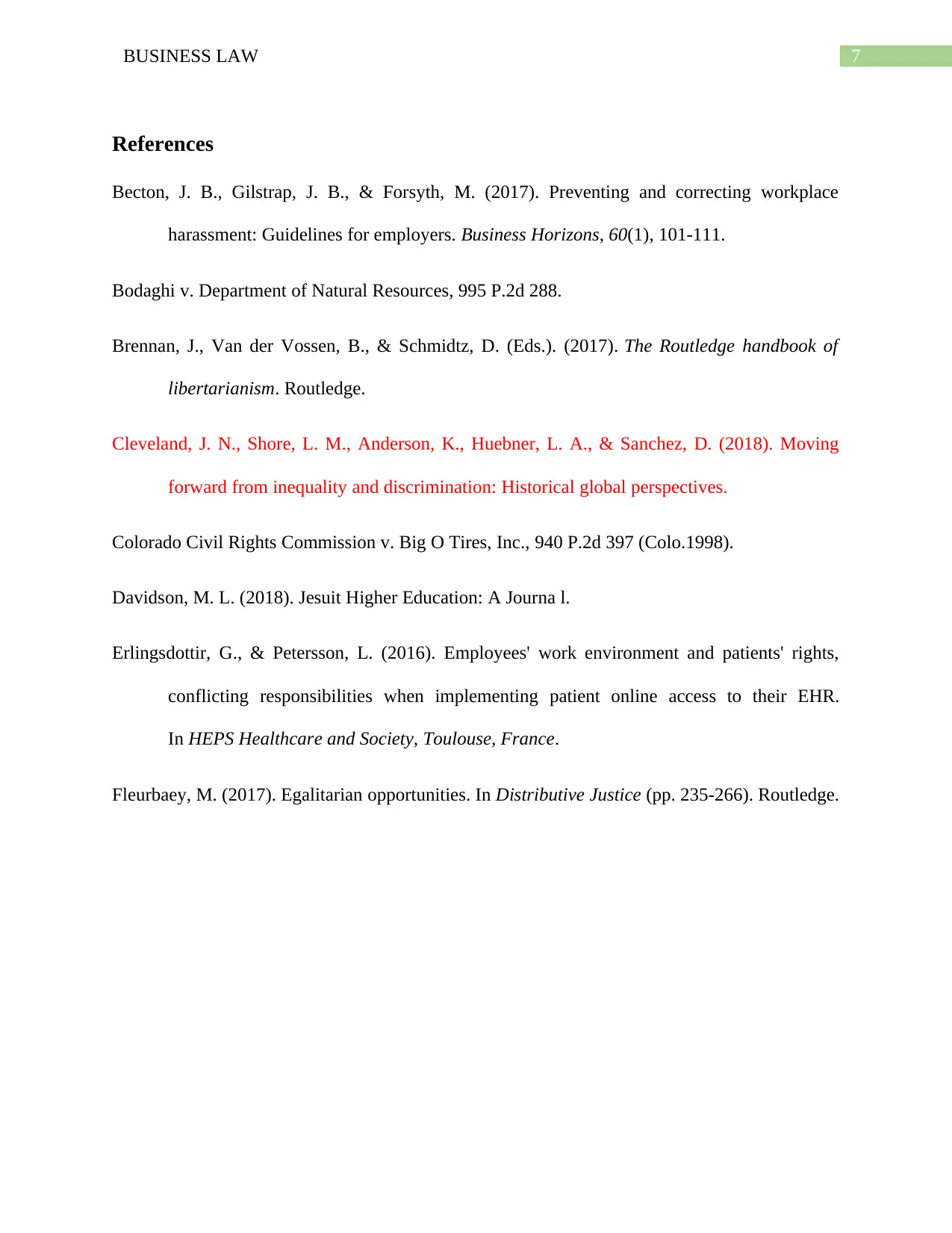
7BUSINESS LAW
References
Becton, J. B., Gilstrap, J. B., & Forsyth, M. (2017). Preventing and correcting workplace
harassment: Guidelines for employers. Business Horizons, 60(1), 101-111.
Bodaghi v. Department of Natural Resources, 995 P.2d 288.
Brennan, J., Van der Vossen, B., & Schmidtz, D. (Eds.). (2017). The Routledge handbook of
libertarianism. Routledge.
Cleveland, J. N., Shore, L. M., Anderson, K., Huebner, L. A., & Sanchez, D. (2018). Moving
forward from inequality and discrimination: Historical global perspectives.
Colorado Civil Rights Commission v. Big O Tires, Inc., 940 P.2d 397 (Colo.1998).
Davidson, M. L. (2018). Jesuit Higher Education: A Journa l.
Erlingsdottir, G., & Petersson, L. (2016). Employees' work environment and patients' rights,
conflicting responsibilities when implementing patient online access to their EHR.
In HEPS Healthcare and Society, Toulouse, France.
Fleurbaey, M. (2017). Egalitarian opportunities. In Distributive Justice (pp. 235-266). Routledge.
References
Becton, J. B., Gilstrap, J. B., & Forsyth, M. (2017). Preventing and correcting workplace
harassment: Guidelines for employers. Business Horizons, 60(1), 101-111.
Bodaghi v. Department of Natural Resources, 995 P.2d 288.
Brennan, J., Van der Vossen, B., & Schmidtz, D. (Eds.). (2017). The Routledge handbook of
libertarianism. Routledge.
Cleveland, J. N., Shore, L. M., Anderson, K., Huebner, L. A., & Sanchez, D. (2018). Moving
forward from inequality and discrimination: Historical global perspectives.
Colorado Civil Rights Commission v. Big O Tires, Inc., 940 P.2d 397 (Colo.1998).
Davidson, M. L. (2018). Jesuit Higher Education: A Journa l.
Erlingsdottir, G., & Petersson, L. (2016). Employees' work environment and patients' rights,
conflicting responsibilities when implementing patient online access to their EHR.
In HEPS Healthcare and Society, Toulouse, France.
Fleurbaey, M. (2017). Egalitarian opportunities. In Distributive Justice (pp. 235-266). Routledge.
1 out of 8
Related Documents
Your All-in-One AI-Powered Toolkit for Academic Success.
+13062052269
info@desklib.com
Available 24*7 on WhatsApp / Email
![[object Object]](/_next/static/media/star-bottom.7253800d.svg)
Unlock your academic potential
© 2024 | Zucol Services PVT LTD | All rights reserved.




